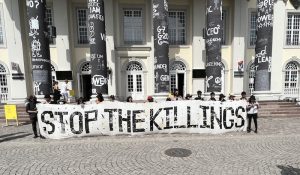In an unprecedented move, the remaining four members of the Finding Committee for Documenta16 have resigned. Simon Njami, Gong Yan, Kathrin Rhomberg, and María Inés Rodríguez submitted a joint resignation letter, following the earlier departure of Bracha Lichtenberg Ettinger and Ranjit Hoskoté—both of whom resigned amidst accusations of anti-Semitism.
The decision of the committee, responsible for shaping the future of one of the world’s leading contemporary art events, has sent shockwaves through the art world. In their resignation letter, they expressed “grave concern for the future of Documenta,” highlighting the necessity for art to interact with cultural, political, and social complexities and bemoaning the absence of conditions in Germany for “appropriate conditions that allow for its diverse perspectives, perceptions, and discourses.”
The series of resignations point towards a widening rift concerning the interpretation and definition of anti-Semitism, particularly in relation to the recent criticism around the direction of Documenta and the public treatment of Hoskoté. Earlier, Hoskoté had been accused of anti-Semitism—a claim he vehemently denies—in relation to his signature on a controversial petition.
In his poignant letter to Professor Dr. Andreas Hoffmann, the managing director of Documenta und Museum Fridericianum gGmbH, Hoskoté describes the accusations against him as “monstrous.” He writes, “The charge of anti-Semitism has been brought against my name in Germany, a country I have regarded with love and admiration… I have been judged, denounced, and stigmatized… subjected to the proceedings of a kangaroo court.”
Hoskoté refutes the claims with details of his own background, which included Jewish connections and alliances against discriminatory ideologies. “Simple biographical factors render this accusation absurd,” he states, adding, “the Shoah is not external to me; it is one of the strands in my own family history.”
Refusing to accept a definition of anti-Semitism that conflates the Jewish people with the Israeli state, Hoskoté worries such definitions suppress human empathy and critical thought. He further contends that the present intellectual and cultural climate has “lost its moral compass” and that it “compromises the generosity of spirit” that has long characterized Germany’s engagement in global cultural politics.
The departure of the remaining committee members—Njami, Yan, Rhomberg, and Rodríguez—adds weight to Hoskoté’s fears that current conditions in Germany stifle necessary and critical debate. Their resignation letter laments the lack of “a space in Germany for an open exchange of ideas” and stresses the restrictive impact of over-simplification of complex issues.
“This emotional and intellectual climate… makes it impossible for us to conceive of a strong and signal exhibition project,” the letter reads.
With a full committee exit, the future of Documenta16 now appears uncertain. As an institution founded in the aftermath of World War II to facilitate critical dialogue through art, the current debacle raises pressing questions about the safeguarding of its legacy. The resignations, and the circumstances leading up to them, have struck at the very principles that have long underscored the event’s global significance.


